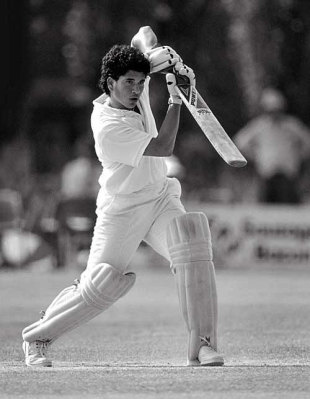 | ||
It is a record Sachin Tendulkar was expected to break. Opening his innings at the tail-end of the last millennium, no one could spend two decades in the international game and not go past his other peers in terms of the number of Tests played.
In their time, the cricketers whose names will now follow Tendulkar's on this list of iron men were once indefatigable: Steve Waugh, it seemed, would never melt and Allan Border looked like he would never crumble.
Yet after them Tendulkar arrived. As he steps into the P Sara stadium on Tuesday morning, this blazing comet of a cricketer, who batted at a rhythm different from Border and Waugh, will become the last of their kind - the long-surviving Test titan.
Stretch the imagination 22 years ahead and see if you can pick any fresh Test stripling of today - Umar Akmal, Eoin Morgan, Steven Smith, Adrian Barath - to go past 170 Tests.
Other than Bradman's 99.94, Tendulkar now owns the marks that batsmen dream about: most runs and most centuries. If those were about skill, this one, 169 Tests, is about his hunger. More than anything else, it is what has taken him this far and what has given his career a mind-bender of a second wind after the gloom of 2006.
The day before his 169th Test appearance, he described his sport much like Glenn McGrath did, calling it 'simple'. In an interview he had once talked about its more complex layers. "There is not a single boring day," he said, "when you don't learn anything new."
Those could have been the words of a young man in his tenth Test but that was circa 2003. Tendulkar the cricketer has switched effortlessly between youth and maturity. When he turned 18 and was by then an 11-Test veteran, his city's signature tabloid Mid-Day put him on the cover of their Sunday magazine supplement, posing on Marine Drive, dressed in a shirt of riotous colour at the wheel of his first car, a Maruti 800.
A taciturn teenager, far from the confident sage of the 21st century, he had these words of wisdom to offer on his coming of age. "When you are 18," he said, "you're not young anymore." When he had gone two series without a hundred, it was said that far too many allowances were being made for his age. In his third series and his ninth Test, three months after turning 17, he batted at No. 6 just ahead of Manoj Prabhakar and produced the first of his 48 centuries in Manchester. It was expected and it happened. This was the prodigy who fit into his India cap with ease, without open tantrum, controversy or angst.
With 168 Tests, Tendulkar has grown up in public and so appears timeless but he is a different man from the cherub who couldn't hide under the helmet grille. Until the first crack of his bat made the annoucement of intent that is. The noise of the crowd lifted him but in the first half of his career, even when captain, Tendulkar lived with a peculiar strain of white line fever. The competitor on the field was a man of deep reserve when outside its boundaries.
Even though he grew up in a slightly more mellow age - one in which his telephone number could be found by looking for his father's name in the Mumbai telephone directory - he lived with public expectation and dependence like no other teammate peer or contemporary. Still, whatever his inner debates about a youth lived in the open, his batting remained reliably resplendent. As he would himself say, there wasn't a day he wasn't learning, be it how to season a long innings with strokes that had until then belonged to his one-day repertoire or experimenting with what it meant to be anchor over aggressor.
What defined him most sharply as the youngest of men in Indian cricket still remains as he becomes the game's oldest. Before the icon and the brand and the deification and the 37kg coffee table books comes the batsman.
It is as if his mind has always been deliberate, undistracted and his heart, when stepping on the field, full with youthful optimism.
He will prepare for his 169th Test just like he always has, in calculated, thoughtful steps.
During nets on Monday, he would have inspected the P Sara wicket and calibrated all the information into method and shot selection. He described it once: "I look at the wicket and the opposition and analyse their strengths and weaknesses and then pick my shots. These are the shots that will bring me closer to 100 per cent success. You try and minimise your risks. But in spite of that you make mistakes."
Then when back in his room, on his own, he will spend ten minutes on a visualisation, part of his pre-match preparation since he was a school boy. He will see the bowlers before him, the stationing of the field, the feel of the ground, the heat or the breeze, the noise of the crowd, "so when I actually go there in the middle it's the second time I'm going there, not the first".
He may pick up the bat he has carried back with him to his hotel like he does every time and maybe shadow practice a little. Just before his 169th match, he will do all of this, part-drill, part-prayer, equal respect given to practice and providence.
When he goes out on the field, with India creaking at their joints, Sachin Tendulkar will have with him a record that is a reminder not of champagne and glory but the ache of endurance. But he will walk lightly because, like always, he will be the young man of 16.
0 comments:
Post a Comment